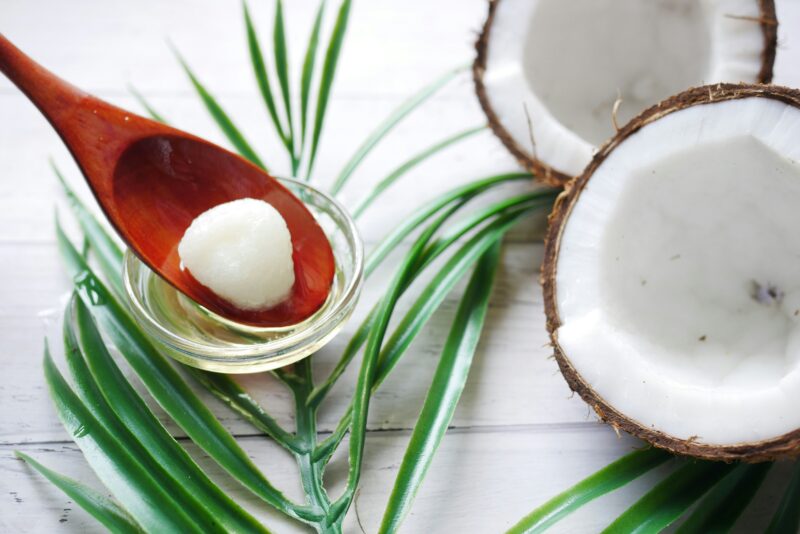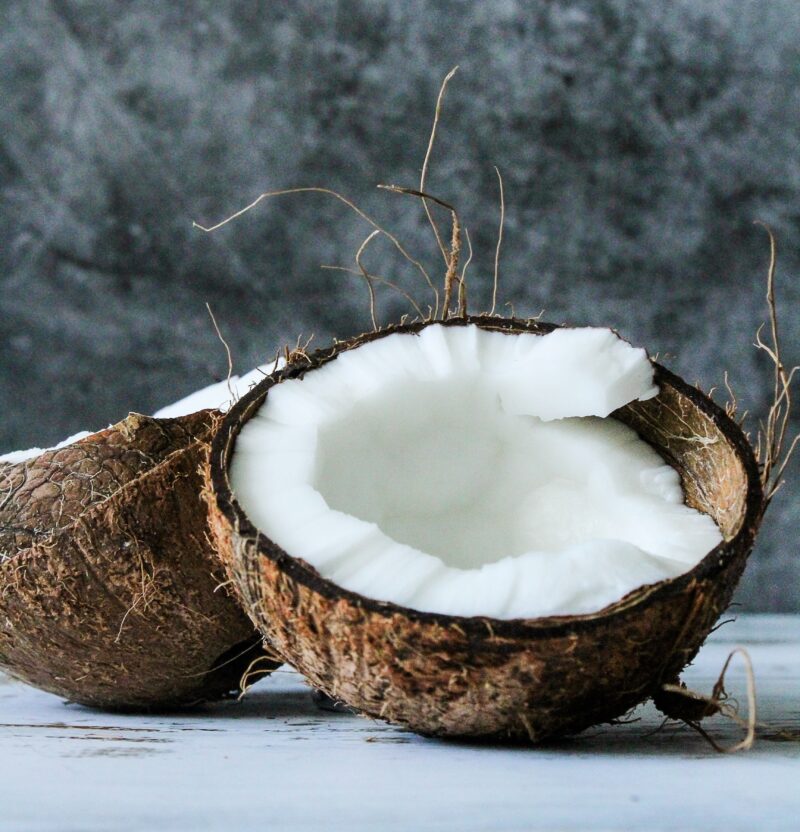Coconut butter vs oil – Coconut-based products have become a popular choice for those seeking healthier options in cooking, baking, and beauty routines. Among the most well-known coconut-derived products are coconut butter and coconut oil. Despite their similarities, these two have distinct differences in nutritional content, uses, and potential health benefits. Making them an excellent choice and a popular ingredient to have in your kitchen cupboards.
This article explores their extraction process, main differences, nutritional value, health advantages, and whether one is a better choice over the other.
What Is Coconut Butter?
Coconut butter, sometimes referred to as true coconut butter or coconut manna, is made from the whole meat of the coconut (coconut flesh). It is produced by blending fresh coconut meat until it forms a creamy spread with a thicker consistency than nut butters like peanut butter. This means it contains dietary fibre, beneficial fatty acids, and essential nutrients present in the flesh of coconuts.
Nutritional Profile Of Coconut Butter
Coconut butter contains a mix of saturated fats, including lauric acid, palmitic acid, and butyric acid, which contribute to its antimicrobial properties and potential health benefits. It also includes fibre content, which supports digestive health and helps in maintaining cholesterol levels.
Health Benefits Of Coconut Butter
- Supports Digestive Health: The fibre content in coconut butter aids digestion and promotes gut health.
- Boosts Immunity: The presence of lauric acid helps combat infections due to its antimicrobial properties.
- Provides Quick Energy: The medium-chain triglycerides (MCTs) in coconut butter provide quick energy.
- Promotes Skin Care: When applied topically, coconut butter helps combat flaky skin, dry skin, and skin irritation.
- Aids in Weight Management: MCTs in coconut butter may assist in weight loss and help support weight management.
- Contains Healthy Fats: The healthy fats in coconut butter support overall well-being.
- Anti-Inflammatory Properties: Coconut butter may offer anti-inflammatory properties, contributing to joint and skin health.
What Is Coconut Oil?
Coconut oil is an edible oil derived from the meat of mature coconuts. There are different types, including virgin coconut oil (unprocessed) and refined coconut oil (processed for a neutral flavour). The extraction process involves pressing the flesh of the coconut to obtain the oil.
Nutritional Profile Of Coconut Oil
Coconut oil is composed mostly of saturated fats, particularly medium-chain triglycerides like lauric acid, which contribute to its high saturated fat content. Unlike coconut butter, coconut oil does not contain fibre but offers essential nutrients such as vitamin E.

Health Benefits Of Coconut Oil
- Boosts Heart Health: Some research suggests that coconut oil offers benefits for HDL cholesterol (good cholesterol) levels and may reduce low-density lipoprotein (LDL) cholesterol.
- High Smoke Point: Coconut oil has a high smoke point, making it ideal for cooking oils used at higher temperatures.
- Aids in Weight Loss: The MCTs in coconut oil promote quick energy and may help with weight loss.
- Skin Care and Beauty: Coconut oil is widely used in beauty routines for treating flaky skin and skin problems.
- Contains Unsaturated Fats: Though primarily composed of saturated fats, coconut oil contains some unsaturated fats that support overall health.
Key Differences Between Coconut Butter & Coconut Oil
| Feature | Coconut Butter | Coconut Oil |
| Made From | Whole coconut | Extracted from coconut meat |
| Texture | Thick and spreadable | Smooth and liquid at room temperature |
| Nutritional Content | Contains dietary fibre and fats | Pure fat, no fibre |
| Common Uses | Spread, smoothies, desserts | Cooking, baking, skin care |
| Smoke Point | Lower | High smoke point |
| Health Benefits | Supports digestive health, skin hydration, immunity | Aids heart health, cholesterol levels, and weight control |
Is One Better Than The Other?
The better choice depends on individual needs:
- For cooking at high temperatures, coconut oil is preferable due to its high smoke point.
- For nutritional benefits, coconut butter is superior as it contains dietary fibre and more essential nutrients.
- For skin care, both can be used, but coconut oil is often more effective for treating dry skin.
- If you want a spreadable texture, coconut butter works well as a creamy spread.
Best Ways To Use Coconut Butter & Coconut Oil
Coconut Butter Uses
- As a creamy spread on toast or mixed into oatmeal.
- In smoothies for a nutritional boost.
- Added to baked goods for a subtle coconut flavour.
- Used as a base for homemade nut butters.
- Combined with coconut milk for a richer texture.
Coconut Oil Uses
- For frying and roasting due to its high smoke point.
- In homemade beauty routines for skin care and hair masks.
- As a dairy-free alternative to butter or olive oil.
- In coffee (Bulletproof Coffee) for a quick energy boost.
The Importance Of Healthy Fats In Your Diet
Many people associate fats with weight gain and heart disease, but healthy fats play a crucial role in maintaining overall health. Incorporating the right types of fats into your diet can have numerous benefits.

Why Are Healthy Fats Important?
- Support Heart Health: Healthy fats, such as monounsaturated fat and unsaturated fats, help balance cholesterol levels and reduce the risk of heart disease.
- Provide Essential Nutrients: Some vitamins, like vitamin E, are fat-soluble, meaning they require fats for absorption.
- Aid in Brain Function: Fats are a key component of brain cells and help with cognitive function.
- Assist in Weight Management: Contrary to popular belief, consuming healthy fats can help regulate appetite and promote weight loss.
- Improve Skin and Hair Health: Natural oils found in fats help keep skin hydrated, reducing skin irritation and flaky skin.
- Boost Energy Levels: Fats are a long-lasting energy source and are especially beneficial when combined with medium-chain triglycerides for quick energy.
Incorporating sources of healthy fats, such as coconut butter, coconut oil, olive oil, and nut butters, into a balanced diet can help you maintain overall well-being.
What To Look For When Buying Coconut Butter & Coconut Oil
When purchasing coconut butter or coconut oil, it’s essential to choose high-quality products to ensure maximum health benefits and purity.
Here are some key factors to consider:
Coconut Butter
- Ingredients – Look for coconut butter made from 100% pure coconut with no added sugars, preservatives, or artificial ingredients.
- Texture & Consistency – High-quality coconut butter should be smooth and creamy when warm but firm at cooler temperatures. Avoid products with a gritty or overly dry texture.
- Organic & Non-GMO – Choose organic coconut butter to avoid pesticides and genetically modified organisms.
- Packaging – Opt for glass jars over plastic to prevent potential chemical leaching.
- Colour & Smell – It should have a natural off-white or light beige colour and a rich, slightly sweet coconut aroma.
Coconut Oil
- Virgin vs. Refined – Virgin (or extra virgin) coconut oil is minimally processed and retains more nutrients and flavour. Refined coconut oil undergoes more processing and may lose some beneficial compounds.
- Cold-Pressed vs. Expeller-Pressed – Cold-pressed coconut oil is extracted without heat, preserving more nutrients and a fresh coconut aroma. Expeller-pressed uses some heat, which may slightly reduce nutrient content.
- Unrefined & Chemical-Free – Avoid coconut oils that are hydrogenated or processed with chemicals like hexane.
- Organic & Non-GMO – As with coconut butter, organic coconut oil ensures a cleaner, higher-quality product.
- Packaging – Glass jars are preferable to prevent contamination from plastic packaging.
- Colour & Scent – High-quality coconut oil should be clear when liquid and pure white when solid, with a mild coconut scent. Rancid or yellowish oil should be avoided.
By keeping these factors in mind, you can ensure that you’re getting the best quality coconut butter and coconut oil for your health and culinary needs.
Difference Between Coconut Butter & Dairy Butter
While coconut butter and regular butter may share a creamy texture, they are fundamentally different in composition and health effects.
Key Differences
- Source: Coconut butter is made from the whole meat of the coconut, while regular butter is a dairy product derived from cow’s milk.
- Nutritional Content: Regular butter contains monounsaturated fat, linoleic acid, and cholesterol, while coconut butter is rich in medium-chain triglycerides and fibre content.
- Lactose-Free: Coconut butter is a plant-based oil alternative to butter and is suitable for those with lactose intolerance.
- Uses: While both can be used as a spreadable texture for bread or in baking, regular butter is better for flaky pastries due to its water content, whereas coconut butter is a popular ingredient in vegan and dairy-free recipes.
- Health Impact: Coconut butter contains beneficial fatty acids and anti-inflammatory properties, while regular butter, high in saturated fats, may contribute to cholesterol levels if consumed in excess.
Coconut Butter vs Oil FAQ’s
1.Does coconut butter or coconut oil have a higher nutritional value?
Coconut butter has more nutritional value as it contains dietary fibre and additional nutrients from the whole coconut.
2.Can coconut oil and coconut butter be used interchangeably?
Not always. Coconut oil is a plant-based oil used for frying and baking, while coconut butter has a thicker consistency and works better as a spread.
3.Which one is better for weight loss?
Both contain MCTs, which may aid in weight loss, but coconut butter provides more fibre content, making it a more filling option.
4.Is coconut oil healthier than olive oil?
It depends on your needs. Olive oil is high in monounsaturated fat and linoleic acid, which may lower the risk of heart disease, while coconut oil provides quick energy and antimicrobial properties.
5.Can coconut oil or butter help with skin problems?
Yes! Coconut oil is commonly used for skin care, especially for dry skin and skin irritation.
6.Is coconut butter the same as shea butter?
No, shea butter is derived from shea nuts and used mainly in cosmetics, while coconut butter is made from the whole meat of the coconut and is edible.
7.Why does coconut oil solidify at colder temperatures?
Coconut oil has a high saturated fat content, which makes it solidify in colder temperatures.
8.Is unrefined coconut oil better than refined?
Yes, unrefined coconut oil (also called virgin coconut oil) retains more natural oils, antioxidants, and flavour compared to refined versions.




